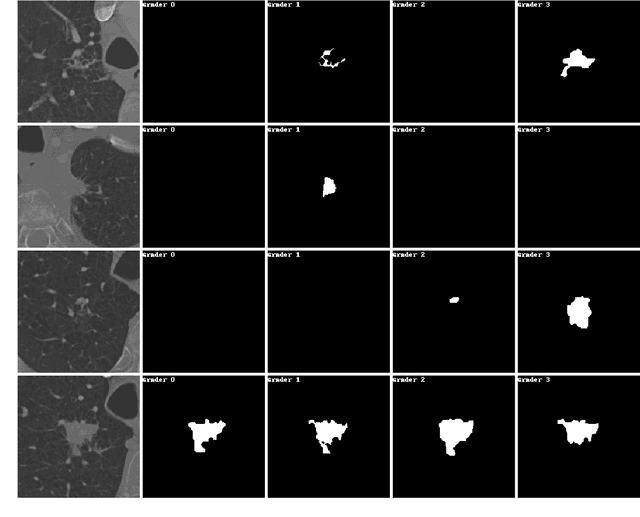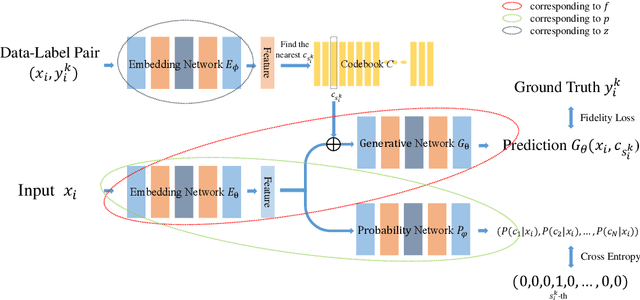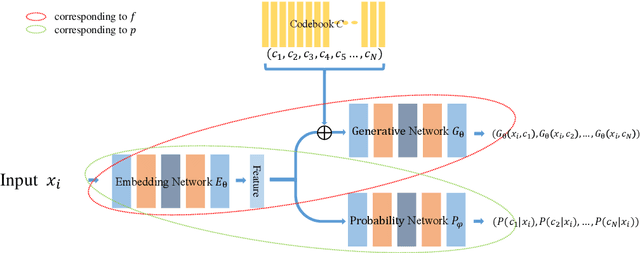Geng Li
DyFo: A Training-Free Dynamic Focus Visual Search for Enhancing LMMs in Fine-Grained Visual Understanding
Apr 21, 2025



Abstract:Humans can effortlessly locate desired objects in cluttered environments, relying on a cognitive mechanism known as visual search to efficiently filter out irrelevant information and focus on task-related regions. Inspired by this process, we propose Dyfo (Dynamic Focus), a training-free dynamic focusing visual search method that enhances fine-grained visual understanding in large multimodal models (LMMs). Unlike existing approaches which require additional modules or data collection, Dyfo leverages a bidirectional interaction between LMMs and visual experts, using a Monte Carlo Tree Search (MCTS) algorithm to simulate human-like focus adjustments. This enables LMMs to focus on key visual regions while filtering out irrelevant content, without introducing additional training caused by vocabulary expansion or the integration of specialized localization modules. Experimental results demonstrate that Dyfo significantly improves fine-grained visual understanding and reduces hallucination issues in LMMs, achieving superior performance across both fixed and dynamic resolution models. The code is available at https://github.com/PKU-ICST-MIPL/DyFo_CVPR2025
FingER: Content Aware Fine-grained Evaluation with Reasoning for AI-Generated Videos
Apr 14, 2025



Abstract:Recent advances in video generation have posed great challenges in the assessment of AI-generated content, particularly with the emergence of increasingly sophisticated models. The various inconsistencies and defects observed in such videos are inherently complex, making overall scoring notoriously difficult. In this paper, we emphasize the critical importance of integrating fine-grained reasoning into video evaluation, and we propose $\textbf{F}$ing$\textbf{ER}$, a novel entity-level reasoning evaluation framework that first automatically generates $\textbf{F}$ine-grained $\textbf{E}$ntity-level questions, and then answers those questions by a $\textbf{R}$easoning model with scores, which can be subsequently weighted summed to an overall score for different applications. Specifically, we leverage LLMs to derive entity-level questions across five distinct perspectives, which (i) often focus on some specific entities of the content, thereby making answering or scoring much easier by MLLMs, and (ii) are more interpretable. Then we construct a FingER dataset, consisting of approximately 3.3k videos and corresponding 60k fine-grained QA annotations, each with detailed reasons. Based on that, we further investigate various training protocols to best incentivize the reasoning capability of MLLMs for correct answer prediction. Extensive experiments demonstrate that a reasoning model trained using Group Relative Policy Optimization (GRPO) with a cold-start strategy achieves the best performance. Notably, our model surpasses existing methods by a relative margin of $11.8\%$ on GenAI-Bench and $5.5\%$ on MonetBench with only 3.3k training videos, which is at most one-tenth of the training samples utilized by other methods. Our code and dataset will be released soon.
Analyzing and Boosting the Power of Fine-Grained Visual Recognition for Multi-modal Large Language Models
Jan 25, 2025Abstract:Multi-modal large language models (MLLMs) have shown remarkable abilities in various visual understanding tasks. However, MLLMs still struggle with fine-grained visual recognition (FGVR), which aims to identify subordinate-level categories from images. This can negatively impact more advanced capabilities of MLLMs, such as object-centric visual question answering and reasoning. In our study, we revisit three quintessential capabilities of MLLMs for FGVR, including object information extraction, category knowledge reserve, object-category alignment, and position of the root cause as a misalignment problem. To address this issue, we present Finedefics, an MLLM that enhances the model's FGVR capability by incorporating informative attribute descriptions of objects into the training phase. We employ contrastive learning on object-attribute pairs and attribute-category pairs simultaneously and use examples from similar but incorrect categories as hard negatives, naturally bringing representations of visual objects and category names closer. Extensive evaluations across multiple popular FGVR datasets demonstrate that Finedefics outperforms existing MLLMs of comparable parameter sizes, showcasing its remarkable efficacy. The code is available at https://github.com/PKU-ICST-MIPL/Finedefics_ICLR2025.
UniRiT: Towards Few-Shot Non-Rigid Point Cloud Registration
Oct 30, 2024Abstract:Non-rigid point cloud registration is a critical challenge in 3D scene understanding, particularly in surgical navigation. Although existing methods achieve excellent performance when trained on large-scale, high-quality datasets, these datasets are prohibitively expensive to collect and annotate, e.g., organ data in authentic medical scenarios. With insufficient training samples and data noise, existing methods degrade significantly since non-rigid patterns are more flexible and complicated than rigid ones, and the distributions across samples are more distinct, leading to higher difficulty in representation learning with few data. In this work, we aim to deal with this challenging few-shot non-rigid point cloud registration problem. Based on the observation that complex non-rigid transformation patterns can be decomposed into rigid and small non-rigid transformations, we propose a novel and effective framework, UniRiT. UniRiT adopts a two-step registration strategy that first aligns the centroids of the source and target point clouds and then refines the registration with non-rigid transformations, thereby significantly reducing the problem complexity. To validate the performance of UniRiT on real-world datasets, we introduce a new dataset, MedMatch3D, which consists of real human organs and exhibits high variability in sample distribution. We further establish a new challenging benchmark for few-shot non-rigid registration. Extensive empirical results demonstrate that UniRiT achieves state-of-the-art performance on MedMatch3D, improving the existing best approach by 94.22%.
GERA: Geometric Embedding for Efficient Point Registration Analysis
Oct 01, 2024Abstract:Point cloud registration aims to provide estimated transformations to align point clouds, which plays a crucial role in pose estimation of various navigation systems, such as surgical guidance systems and autonomous vehicles. Despite the impressive performance of recent models on benchmark datasets, many rely on complex modules like KPConv and Transformers, which impose significant computational and memory demands. These requirements hinder their practical application, particularly in resource-constrained environments such as mobile robotics. In this paper, we propose a novel point cloud registration network that leverages a pure MLP architecture, constructing geometric information offline. This approach eliminates the computational and memory burdens associated with traditional complex feature extractors and significantly reduces inference time and resource consumption. Our method is the first to replace 3D coordinate inputs with offline-constructed geometric encoding, improving generalization and stability, as demonstrated by Maximum Mean Discrepancy (MMD) comparisons. This efficient and accurate geometric representation marks a significant advancement in point cloud analysis, particularly for applications requiring fast and reliability.
A deep neural network framework for dynamic multi-valued mapping estimation and its applications
Jun 29, 2024



Abstract:This paper addresses the problem of modeling and estimating dynamic multi-valued mappings. While most mathematical models provide a unique solution for a given input, real-world applications often lack deterministic solutions. In such scenarios, estimating dynamic multi-valued mappings is necessary to suggest different reasonable solutions for each input. This paper introduces a deep neural network framework incorporating a generative network and a classification component. The objective is to model the dynamic multi-valued mapping between the input and output by providing a reliable uncertainty measurement. Generating multiple solutions for a given input involves utilizing a discrete codebook comprising finite variables. These variables are fed into a generative network along with the input, producing various output possibilities. The discreteness of the codebook enables efficient estimation of the output's conditional probability distribution for any given input using a classifier. By jointly optimizing the discrete codebook and its uncertainty estimation during training using a specially designed loss function, a highly accurate approximation is achieved. The effectiveness of our proposed framework is demonstrated through its application to various imaging problems, using both synthetic and real imaging data. Experimental results show that our framework accurately estimates the dynamic multi-valued mapping with uncertainty estimation.
EEML: Ensemble Embedded Meta-learning
Jun 18, 2022



Abstract:To accelerate learning process with few samples, meta-learning resorts to prior knowledge from previous tasks. However, the inconsistent task distribution and heterogeneity is hard to be handled through a global sharing model initialization. In this paper, based on gradient-based meta-learning, we propose an ensemble embedded meta-learning algorithm (EEML) that explicitly utilizes multi-model-ensemble to organize prior knowledge into diverse specific experts. We rely on a task embedding cluster mechanism to deliver diverse tasks to matching experts in training process and instruct how experts collaborate in test phase. As a result, the multi experts can focus on their own area of expertise and cooperate in upcoming task to solve the task heterogeneity. The experimental results show that the proposed method outperforms recent state-of-the-arts easily in few-shot learning problem, which validates the importance of differentiation and cooperation.
FL-AGCNS: Federated Learning Framework for Automatic Graph Convolutional Network Search
Apr 09, 2021



Abstract:Recently, some Neural Architecture Search (NAS) techniques are proposed for the automatic design of Graph Convolutional Network (GCN) architectures. They bring great convenience to the use of GCN, but could hardly apply to the Federated Learning (FL) scenarios with distributed and private datasets, which limit their applications. Moreover, they need to train many candidate GCN models from scratch, which is inefficient for FL. To address these challenges, we propose FL-AGCNS, an efficient GCN NAS algorithm suitable for FL scenarios. FL-AGCNS designs a federated evolutionary optimization strategy to enable distributed agents to cooperatively design powerful GCN models while keeping personal information on local devices. Besides, it applies the GCN SuperNet and a weight sharing strategy to speed up the evaluation of GCN models. Experimental results show that FL-AGCNS can find better GCN models in short time under the FL framework, surpassing the state-of-the-arts NAS methods and GCN models.
 Add to Chrome
Add to Chrome Add to Firefox
Add to Firefox Add to Edge
Add to Edge